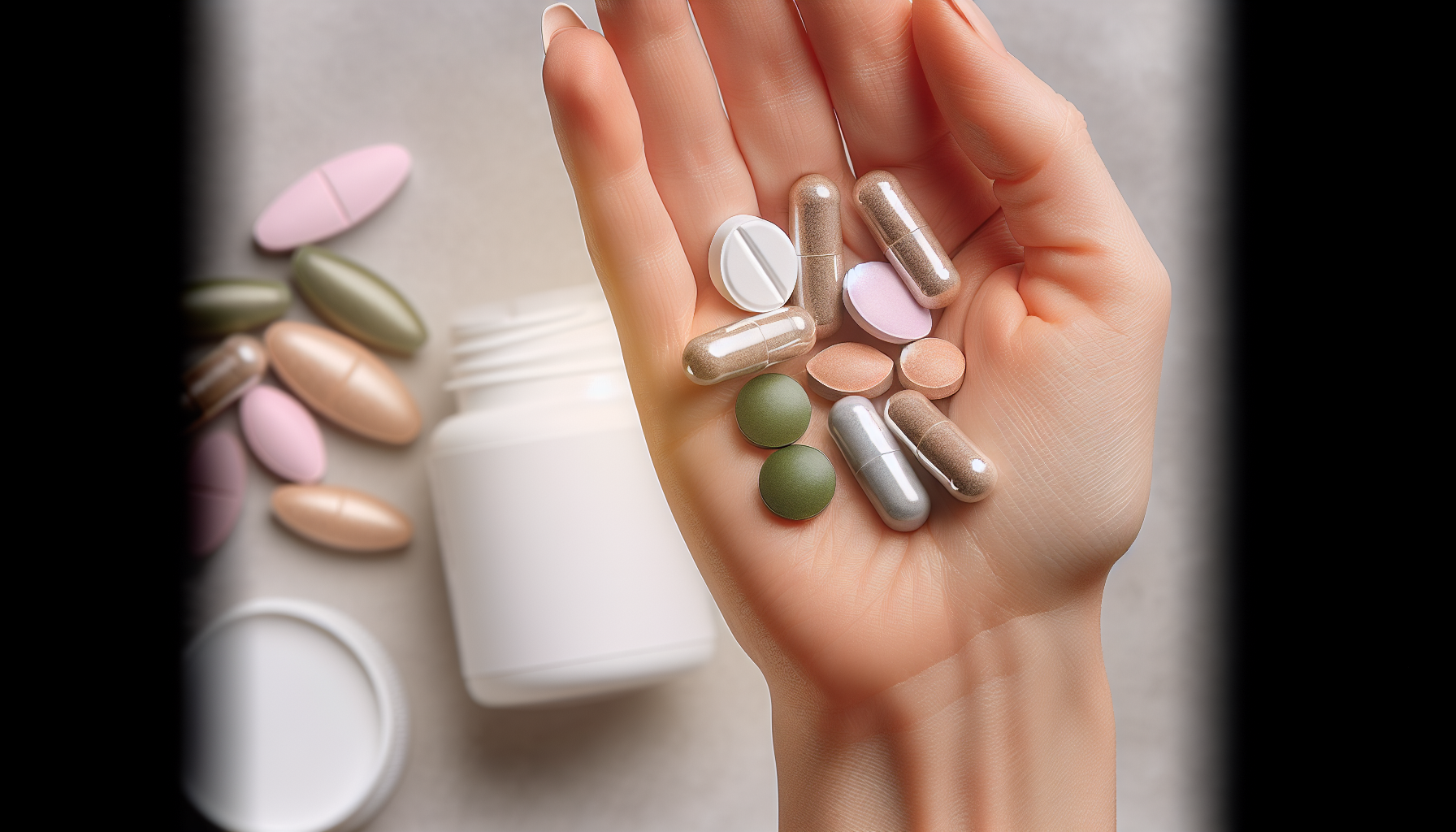Zinc, a trace element, plays a significant role in maintaining our well-being. It’s involved in numerous aspects of cellular metabolism, including immune function, wound healing, and DNA synthesis, to name a few. Unfortunately, many of us may not be getting enough, leading to potential health problems such as compromised immunity, delayed wound healing, and more. Enter zinc supplements, a simple solution to ensure our bodies have the necessary zinc levels to function optimally. But with a plethora of zinc supplements on the market, how do you choose the best supplement for zinc? And once you do, how do you maximize its benefits? Let’s dive into the world of zinc supplements to answer these questions and more.
Key Takeaways
Zinc supplements come in various forms like capsules, lozenges, and liquids, with types including elemental zinc and chelated forms for better bioavailability and diverse health benefits such as immune support and wound healing.
The appropriate dosage for zinc supplements is contingent upon individual needs based on age, gender, diet, and health conditions, with a general safe upper limit of 40 mg daily for adults to prevent toxicity and specific guidelines for different groups.
Choosing a high-quality zinc supplement involves considering certifications like NSF or USP, ingredient transparency, and reputable brands, while being mindful of dosage and potential interactions with medications to ensure optimal absorption and effectiveness.
Decoding Zinc Supplements: Types and Efficacy

With a myriad of zinc supplements available, it can be quite overwhelming to choose the right one. But rest assured, each type of supplement has its unique benefits and is designed to cater to different individual needs.
Zinc supplements come in various forms including capsules, lozenges, and liquids, with some even containing zinc oxide as an ingredient. These supplements offer an array of potential health benefits such as supporting immune system health and helping manage flu symptoms, particularly for individuals with inadequate zinc intake from food or issues with absorption.
Keep in mind, the bioavailability of zinc can vary based on the source. For instance, while zinc is present in beans, nuts, and whole grains, its bioavailability is lower compared to animal sources due to the presence of phytates. Fruits and vegetables, on the other hand, contain minimal amounts of zinc. This is where supplemental zinc can help bridge the gap for individuals with inadequate dietary intake.
Consider factors like the form of zinc, recommended dosage, and price while selecting a zinc supplement. Additionally, the efficacy of the zinc for immune health should be taken into account.
Elemental Zinc vs. Chelated Forms
When it comes to zinc supplements, one of the first choices you’ll need to make is between elemental zinc and chelated forms. But what’s the difference?
Elemental zinc is less bioavailable than chelated forms, which are bound to amino acids for better absorption. Chelated zinc takes on various forms including:
zinc picolinate
zinc gluconate
zinc citrate
amino acid chelates
All of these forms are generally better absorbed in the body compared to elemental forms such as zinc sulfate or oxide. This is because chelated zinc is attached to organic acids, enhancing its absorption.
Furthermore, chelated zinc is known to support immune function, potentially aid in the treatment of diarrhea, and promote wound healing.
Zinc Lozenges and Their Benefits

Zinc lozenges have gained popularity over the years, particularly for their efficacy in treating cold symptoms. But how do they work, and what are their benefits?
Research suggests that zinc lozenges have a significant impact on reducing the duration of cold symptoms. In fact, daily doses over 75 mg may decrease the length of a cold by 12% to 48%, and on average, by two days when taken soon after the onset of symptoms. The suggested daily dosage of zinc lozenges for the treatment of the common cold is 80-92 mg, divided into doses taken every 2 to 3 hours within 48 hours of the onset of symptoms.
Being conscious of potential side effects is also crucial. Some common ones include:
unpleasant taste
mouth irritation
nausea
indigestion
diarrhea
Extremely high doses may even result in stomach pain and other complications.
Innovations in Zinc Supplementation
The world of zinc supplementation is not static. Scientists and researchers are constantly on the lookout for new ways to enhance the benefits of zinc supplements, and one such advancement is the introduction of Zinc Max, a zinc bisglycinate chelate product.
This new formulation is designed for better body absorption, enhancing its effectiveness. However, bear in mind that zinc’s bioaccessibility from dietary supplements can fluctuate. For instance, a predominantly refined cereal grains or vegetarian diet is estimated to have a zinc bioavailability of 26–34%, while a diet high in unrefined cereals is estimated to absorb 18–26% of zinc.
Analyzing Dosage: How Much Zinc Do You Need?

Having understood the different types of zinc supplements and their benefits, the next key question to address is – what’s the right amount of zinc for you? The answer to this question isn’t as straightforward as you might think.
The determination of the suitable zinc dosage is contingent upon individual requirements, which are influenced by factors such as age, gender, and health condition. Men over the age of 19 are advised to consume 11 milligrams of zinc per day, while most women are recommended to consume 8 milligrams daily. This shows a difference in the recommended daily allowance for zinc between men and women. For infants, the maximum daily intake recommended is 4-7 mg per day.
But what if you have a mild zinc deficiency? The recommended dosage is 2-3 times the RDA, and the safe upper limit for daily zinc intake for adults is 40 mg to prevent toxicity. However, keep in mind that these guidelines are general and might not suit everyone.
That’s why it’s always a good idea to get personalized advice from a healthcare professional. This is especially true for athletes, vegetarians, and individuals with certain health conditions who may need higher dosages.
Personalizing Your Zinc Intake
The idea of personalized zinc intake is based on the principle that everyone’s nutritional needs are unique. Factors such as:
zinc status
genetic factors
dietary intake
absorption capacity
alcoholism
age
can all influence the amount of zinc your body needs.
For example, the quantity of zinc required by an individual can be influenced by their dietary intake. Animal-based foods tend to be absorbed more efficiently by the body compared to plant-based foods.
Lifestyle choices also play a significant role. For instance, vegetarians, particularly those whose primary food sources are grains and legumes, may have an increased need for dietary zinc due to the presence of phytic acid in these foods, which hinders zinc absorption. Similarly, certain health conditions such as Crohn’s disease, ulcerative colitis, or short bowel syndrome can result in zinc deficiency, necessitating a higher intake.
When to Seek Higher Dosage
While the recommended daily intake of zinc is generally sufficient for most individuals, there are certain instances where a higher dosage may be necessary.
Athletes, for instance, might require higher doses of zinc supplements due to increased demands from physical exertion. Gender also plays a role, with men generally having higher zinc needs than women. It is suggested that supplementation doses of 30-60 mg of zinc per day can be beneficial for athletes to meet these incremented requirements.
Similarly, vegans and vegetarians may need to take additional measures to ensure they receive adequate zinc in their diets.
Quality Matters: Selecting a High-Quality Zinc Supplement
The process of selecting a high-quality zinc supplement extends beyond merely choosing the first option you come across. Factors such as certifications, ingredient transparency, and brand reputation all come into play.
Certifications and quality standards, such as NSF certification and being manufactured in NSF-registered GMP facilities, serve to validate the quality and precision of zinc supplements. These standards are dependable markers of a product’s safety and effectiveness.
Ingredient transparency is another crucial consideration. It enables consumers to make well-informed decisions regarding the quality and safety of the supplement. This ensures that the supplement aligns with specific dietary needs and preferences, ultimately fostering trust with the manufacturer.
When it comes to brands, companies such as:
Pure Encapsulations ONE Multivitamin
Nature’s Bounty Zinc Caplets
Nature Made Zinc
Thorne Research Zinc Picolinate
Puritan’s Pride Zinc for Acne 25 mg
Our company is highly regarded and renowned for their high-quality oral zinc supplements, including zinc acetate.
The Role of Certifications
Third-party certifications are a powerful tool for ensuring supplement quality, safety, and efficacy. They offer an additional layer of confidence for consumers and assist them in making well-informed choices.
Some of the most highly regarded third-party certifications for dietary supplements include:
Certified Gluten-Free
NSF
USP
USDA Organic
Non-GMO Project Verified
ConsumerLab
U.S. Pharmacopeia
NSF
The certification process guarantees the effectiveness of zinc supplements by assessing the ingredients, composition, and safety standards of the product. For instance, the USP Verified Mark is granted to dietary supplement products that satisfy the rigorous criteria established by USP.
Ingredient Transparency
Ingredient transparency is a significant consideration when selecting a zinc supplement. It refers to the practice of supplement brands openly revealing the components and manufacturing process of their products. This is particularly crucial for zinc supplements as it guarantees that consumers are well-informed about the quality and purity of the supplement.
Consumers can verify ingredient transparency in a zinc supplement by thoroughly examining the supplement label and ensuring that it contains a thorough list of ingredients, encompassing:
Fillers
Sweeteners
Preservatives
Additives
Furthermore, there are regulations in place to ensure ingredient transparency in supplements. The FDA mandates that dietary supplements adhere to distinct rules separate from those governing conventional food and drug products.
Timing and Interaction: Maximizing Zinc Absorption
After choosing a suitable zinc supplement, the following step is to ascertain the optimal time to take it to enhance absorption. But timing isn’t the only factor to consider – potential interactions with medications can also affect absorption and effectiveness.
Generally, consuming zinc with a meal can mitigate certain adverse effects such as nausea, upset stomach, or diarrhea, potentially improving zinc absorption. However, zinc can interact with various medications such as:
Quinolone antibiotics
Tetracyclines
Cisplatin
Penicillamine
Cephalexin
Ritonavir
Integrase inhibitors
These interactions can potentially affect the absorption and effectiveness of zinc.
Food Synergy and Zinc Absorption

The role of food synergy in maximizing zinc absorption cannot be overstated. Certain foods can enhance absorption, while others may inhibit it.
Foods such as oysters, red meat, poultry, seafood, nuts, yeast-based breads, sourdough breads, sprouts, legumes, mushrooms, spinach, broccoli, kale, and garlic are known to enhance the absorption of zinc. On the other hand, foods such as cereals, corn, rice, beans, nuts, and whole grains should be avoided to a certain extent as they contain phytates, which have the potential to inhibit the absorption of zinc.
Food synergy refers to the interactions between nutrients that can influence each other’s absorption. In the case of zinc, its absorption in the small intestine plays a crucial role in maintaining the body’s zinc homeostasis and can be influenced by other minerals such as copper and manganese.
Medication Interactions
Zinc supplements, while beneficial, can interact with certain medications. It’s important to be aware of potential interactions and always consult with a healthcare professional if you’re on medication.
For instance, zinc supplements have the potential to negatively interact with blood pressure medications such as amiloride, ACE inhibitors, and losartan. Additionally, thiazide diuretics, a type of blood pressure medication, can lead to increased loss of zinc through urine.
Zinc Deficiency: Who Needs Supplements the Most?
Zinc deficiency is a serious issue that can result in a variety of health issues, from compromised immune function to reproductive problems in children. Certain populations are particularly at risk of zinc deficiency and may benefit from supplementation.
Groups at increased risk for zinc deficiency include:
Those with limited intake of absorbable zinc, such as many low-income and middle-income countries where meat and fish are less common in diets
Pregnant individuals and their infants
Children with sickle cell disease (SCD)
These groups are notably susceptible to zinc deficiency.
A deficiency in zinc can result in a variety of health issues, such as:
delayed wound healing
cognitive alterations in elderly individuals
impaired growth
decreased appetite
reproductive problems in children.
Zinc supplementation has the potential to alleviate the adverse effects of deficiency, especially in high-risk populations. In children with SCD, it may:
Improve growth
Reduce the likelihood of bacterial infections
Reduce hospitalizations
Reduce vaso-occlusive pain crises.
Dietary Zinc Intake vs. Supplementation
While zinc supplementation can be a useful tool in managing zinc deficiency, it’s also important to consider dietary zinc intake. In fact, balancing dietary intake and supplementation can help maintain optimal zinc levels.
The most optimal dietary sources of zinc encompass:
Meat
Shellfish
Legumes
Seeds
Nuts
Dairy
Eggs
Whole grains
Oysters are notably high in zinc. The average dietary zinc intake for adults is 8 mg for women and 11 mg for men.
However, the body generally absorbs 20-40% of the zinc present in food, with zinc from animal sources being more readily absorbed than that from plant sources. Zinc supplements are also efficiently absorbed by the body. Numerous factors can have an impact on the absorption of dietary zinc, including:
the presence of inhibitors such as food-derived macromolecules and low molecular weight ligands
intestinal diseases
dietary components like fiber, phytate, tin, calcium, and phosphorus.
Addressing Copper Deficiency Risks
Despite the numerous benefits of zinc supplements, it’s essential to recognize potential risks. One such risk is the development of copper deficiency, which can occur with excessive zinc intake. Zinc supplementation diminishes the quantity of copper absorbed by the body, and excessive intake of zinc can result in copper deficiency. It is generally advised to concurrently take 2 mg of copper with a zinc supplement to mitigate this potential issue.
The symptoms of copper deficiency resulting from excessive zinc intake may encompass hypochromic-microcytic anemia, leukopenia, and neutropenia. Additionally, high doses of zinc can potentially cause irreversible neurological symptoms. To mitigate the risk of copper deficiency, it is advisable to strive to achieve the recommended levels of zinc and copper through dietary means or to consider taking a copper supplement under the guidance of a healthcare professional.
Safety First: Understanding the Risks of Excessive Zinc
Zinc supplements offer numerous health benefits, but it’s equally crucial to consider the potential risks associated with excessive zinc intake. Understanding these risks is crucial for maintaining safety and avoiding potential side effects. Adverse effects of excessive zinc intake may include:
Nausea
Vomiting
Loss of appetite
Headaches
Diarrhea
Decreased immune function
Low copper levels
Reduced levels of HDL (good) cholesterol.
Moreover, prolonged and excessive use of certain products such as denture adhesive creams that contain zinc can cause zinc toxicity, leading to copper deficiency and neurologic conditions like sensory ataxia, myelopathy, and anemia. In order to prevent nausea, it is advisable to consume zinc supplements alongside food. If the consumption of high doses of zinc supplements is already inducing nausea, this approach can assist in alleviating the symptom.
Recognizing Symptoms of Over-Supplementation
Recognizing the symptoms of over-supplementation is crucial for preventing adverse effects. It can help you adjust your zinc intake and seek medical help if necessary.
Immediate symptoms that could indicate an excessive intake of zinc include nausea, dizziness, headaches, upset stomach, vomiting, and loss of appetite.
However, an excessive intake of zinc over a prolonged period can have more serious implications. This can result in more serious health complications such as gastric distress, abdominal pain, and diarrhea, necessitating medical intervention for these chronic symptoms.
Navigating High Dose Zinc Supplements
Zinc supplements offer numerous health benefits, but it’s equally important to exercise caution when taking high doses. High dose zinc supplements should be used under the guidance of a healthcare professional to prevent potential risks.
A high dose of zinc supplements is generally defined as any quantity surpassing the recommended dietary allowance, which is 11 mg for adult men and 8 mg for women per day. The National Institutes of Health has established an upper limit of 40 mg per day for adults to mitigate adverse effects, so it’s crucial to consider the zinc per serving when taking supplements.
Potential hazards of high-dose zinc supplements include:
Indigestion
Diarrhea
Headache
Nausea
Vomiting
Potential for chronic zinc toxicity
These side effects necessitate monitoring, and high-dose supplementation should be administered under the supervision of a healthcare professional.
The Intersection of Zinc and Overall Health
Zinc plays a vital role in our overall health. Beyond its benefits for the immune system and chronic disease management, zinc is involved in numerous aspects of cellular metabolism.
Zinc is involved in maintaining immune system health, protein and DNA synthesis, facilitating the wound healing process, and is essential for the body’s gustatory and olfactory functions.
Zinc supplementation can also be beneficial for individuals with specific health conditions such as HIV and childhood acute diarrhea. Studies have shown that zinc supplementation can lower rates of immunological failure events and diarrhea in individuals with HIV. Additionally, in the case of acute childhood diarrhea, zinc has been found to shorten its duration and decrease the likelihood of its persistence.
Zinc’s Role in Immune System Support

Zinc plays a significant role in supporting the immune system. It’s essential for proper immune function and can help reduce the duration of cold symptoms.
Zinc contributes to the immune system by supporting thymic regeneration, T-cell development, and the normal development and function of cells mediating innate immunity. Research suggests that initiating zinc supplementation early in the onset of a cold can lead to a reduction in symptoms by an average of two days.
Beyond Immunity: Zinc in Chronic Disease Management
While zinc’s role in immune support is well-recognized, it also plays a vital role in managing chronic diseases. Some of the key benefits of zinc in chronic disease management include:
Supporting wound healing
Regulating blood sugar levels
Promoting healthy skin and hair
Boosting cognitive function
Enhancing fertility and reproductive health
These benefits underscore the importance of zinc in overall health.
Zinc supplementation has demonstrated benefits in the management of chronic liver diseases, including a reduced incidence of hepatocellular carcinoma (HCC) and events such as death or liver cancer. Furthermore, it has been observed that zinc supplementation decreases the occurrence of infections in the elderly.
Zinc also plays a significant role in regulating blood sugar levels. It regulates blood sugar levels through its ability to:
Improve glucose control
Reduce glucose absorption in the intestines
Decrease glucose synthesis in the liver
Enhance peripheral insulin sensitivity
Best Zinc Supplements Reviewed
Given the plethora of options, selecting the best zinc supplement can be a challenging task. But don’t worry, we’ve got you covered. We’ve reviewed some of the top zinc supplements based on various criteria such as cost, zinc content per serving, and third-party certification.
The top zinc supplements are determined by various factors such as:
Cost
Zinc content per serving
Third-party certification from reputable organizations like USP, NSF, or ConsumerLab.com
Absorption
Dosage
Taking these factors into account will help you choose the best zinc supplement for your needs.
For instance, Klean Athlete Zinc is highly regarded as it adheres to the rigorous standards of NSF International’s Certified for Sport program, guaranteeing that it does not contain any harmful levels of impurities, forbidden substances, or masking agents.
However, it’s also important to be aware of potential side effects. For instance, Klean Athlete Zinc may lead to bloating and gastrointestinal issues in some individuals, attributed to its sugar alcohol content.
Spotlight on Consumer Favorites
When choosing a zinc supplement, it can be helpful to see what other consumers are saying. Consumer reviews can provide valuable insights into the effectiveness and quality of different supplements.
Several zinc supplements highly regarded by consumers include Thorne Zinc Picolinate and NOW Foods Zinc Glycinate. Additionally, supplements that consistently receive positive reviews are Pure Encapsulations ONE Multivitamin, Thorne Zinc Picolinate, Care/of Zinc, NOW, Nature Made Zinc, Now Zinc Glycinate, Solaray, and Source Naturals.
Consumers seek zinc supplements that promote diverse bodily functions, bolster the immune system, and aid in heart health. Common variations include zinc picolinate, citrate, or gluconate.
Budget-Friendly Options
While the quality of a zinc supplement is important, it’s also crucial to consider your budget. Luckily, there are plenty of budget-friendly options that still offer high quality and effectiveness. Nature Made Zinc and Now Foods Zinc Glycinate Softgels are considered top choices for affordable zinc supplements in the market. They have received positive customer reviews for their cost-effectiveness and efficacy.
Even though they are more affordable, budget zinc supplements such as Nature Made Zinc and Now Foods Zinc Glycinate Softgels have shown efficacy in significant health outcomes, such as reducing diarrhea and pneumonia incidence in children, suggesting that they can be equally effective as their premium counterparts.
Summary
In conclusion, zinc supplements offer a range of benefits, from supporting immune function to aiding in chronic disease management. However, it’s crucial to choose high-quality supplements, consider individual zinc requirements, and be aware of potential interactions and risks. Whether you’re a vegetarian, an athlete, or someone looking to boost their immune system, there’s a zinc supplement out there for you. Remember, it’s always best to consult with a healthcare professional before starting any new supplement regimen.
Frequently Asked Questions
What is the best form of zinc to take as a supplement?
The best form of zinc to take as a supplement is zinc picolinate, zinc citrate, zinc acetate, zinc glycerate, or zinc monomethionine, as they are more easily absorbed than zinc sulfate. Look for the amount of elemental zinc listed on the product label, typically 30-50 mg.
Is 50 mg of zinc too much?
Taking more than 40 mg of zinc per day is not recommended, as it could lead to digestive issues, decreased copper absorption, and reduced effectiveness of certain antibiotics. It’s important to consult with a doctor before exceeding this limit.
How much zinc should I take daily?
You should take 11 mg of zinc daily as an adult man, and 8 mg for women. Pregnancy and lactation require slightly more at 11 mg and 12 mg, respectively. It’s important not to exceed the Tolerable Upper Intake Level.
What supplement helps zinc absorption?
Certain supplements, like those containing vitamin C and vitamin D, as well as amino acids like histidine and methionine, can help improve the body’s absorption of zinc. Pairing zinc supplements with a meal can also enhance zinc absorption.
How does zinc support the immune system?
Zinc supports the immune system by contributing to thymic regeneration, T-cell development, and the normal function of cells mediating innate immunity. These functions enhance overall immune response.